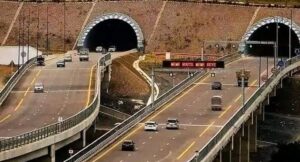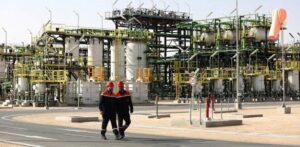Algerian president Abdelmadjid Tebboune won the elections held on September 7 for a second term, with 84.30% which confirms his popularity among the Algerian people, after the great successes he achieved at the political, economic and diplomatic levels.
To be noted, President Tebboune took power at the end of December 2019, and in March 2020 the Covid-19 pandemic occurred, which froze the world’s economies for more than a year, and thus the normal period in which President Tebboune ruled was only three years, during which he was able to achieve remarkable successes, with important political reforms, including:
Amendment of the constitution in 2020 by strengthening democratic gains and adapting it to the requirements of the modern state and the standards of the global economy, moralizing political practice and restoring trust between the ruler and the people, renewing the political class in the local and parliamentary elections in 2021, with a majority of young people, women and scientific competencies, and encouraging the associative activities and the participatory democracy, as well as generalizing digitalization in all sectors, which ensures modern, transparent and effective management, and democratizing governance at various levels and fields..
(Increasing investments and diversifying partnerships:)
Under the leadership of President Abdelmadjid Tebboune, Algeria has made a significant progress by adopting a new investment law in July 2022, with international standards and guarantees, which provides important tax and fiscal exemptions ranging from 3 to 7, and 10 years. The new investment law establishes equality between Algerian and foreign investors, cancelling the 51/49 rule between national and foreigner who can fully own projects, except in certain strategic sectors.
This reform has transformed Algeria into an attractive destination for investments, over 9000 projects have been registered with the Algerian Agency for Investment Promotion (AAPI) in just two years, including 150 foreign projects, with a total value nearing $10 billion. Additionally, a new Monetary and Credit Law was adopted in April 2023, enhancing the Central Bank independence, improving the performance of financial institutions, and offering further facilities and for investors.
In light of the favorable investment climate and activating production mechanisms, diversifying sources of wealth, Algeria has initiated large-scale projects, with reforms of hundreds of thousands of agricultural lands, particularly in desert areas, As a result, agricultural production meets 75% of the country’s needs, while wheat production covers 80%. Algeria is expected to achieve self-sufficiency in the coming years.
In the industrial sector, following the relaunch of the Algerian Agency for Investment Promotion (AAPI) in 2022, accompanied by full digitalization and a single-window system to ensure transparency, expedited registration, monitoring, and implementation processes, thousands of investment projects have been registered, with many already in operation.
This has led to a significant increase in production across various sectors, exceeding domestic demand and enabling export. For example, production capacity of cement exceeds 50 million tons, with an export surplus of 18 million tons. The pharmaceutical industry has also advanced, now covering 75% of the country’s needs.
In the energy and mining sectors, Algeria has launched several major projects that are set to begin production soon, as the Ghar Djebilet iron mine in the south, one of the world’s largest reserves with 3.5 billion tons and annual production capacity of 40 to 50 million tons, and the integrated phosphate project in the east, with reserves of 2.8 billion tons and will produce 10 million tons annually. Additionally, Algeria is expanding its exploitation of lithium, zinc, and lead mines.
Sonatrach, the biggest energy complex in Africa is actively expanding its oil and gas explorations and establishing new petrochemical factories.
Algeria currently produces approximately 1 million barrels of oil per day, and 137 billion M3 of gas. Algeria ranks first in Africa in both gas production and exports, with over 55 billion M3.
(Algeria, The Gateway to Africa, the Third Economy on the Continent:)
Previously ranked as the fourth largest economy in Africa, behind South Africa, Egypt, and Nigeria, Algeria has risen to third place this year under the leadership of President Abdelmadjid Tebboune, with a growth rate of 4.1%. The country’s gross domestic product (GDP) has reached approximately $187 billion, with foreign exchange reserves in foreign currency amounting to $70 billion.
External debt less than $1 billion, with projections indicating GDP could reach around $400 billion by 2027, positioning Algeria to become the second economy in Africa, behind Egypt. To be mentioned, its population is only 47 million, significantly smaller than Nigeria (230 million), Egypt (110 million), and South Africa (61 million).
(Modern Infrastructure, Regional and Continental Integration Policy: )
Infrastructure across various sectors was developed: transport, education, healthcare, railways, and water resources. The country now has 36 airports, 11 seaports, 63 universities, and 50 higher education institutes, with a combined capacity to train 1.7 million students, 120,000 of whom graduate annually.
The total number of hospitals and specialized medical centers is about 3,213 facilities. The pharmaceutical industry has also advanced, by achieving 75% self-sufficiency.
In efforts to secure water resources, Algeria has focused on expanding its desalination capacity. By the end of 2024, the country will have 19 seawater desalination plants producing 3.7 million M3 of water per day, covering 42% of Algerian people needs.
By 2030, the target is to increase this capacity to 5.6 M3per day, meeting over 50% of the country’s demand.
As part of regional and continental integration strategy, Algeria is rapidly expanding its railway network, aiming to connect all cities and regions from the far north and east to the far south and west. The network is expected to reach 6,300 Km soon and 12,500 km by 2030. Similarly, the road network is growing in various directions, exceeding 140,000 km in length, with ongoing work on the 10,000-km Trans-Saharan Highway, linking Algeria with Niger and Nigeria.
Additionally, Algeria is constructing a 900 km road linking the city of Tindouf in southwestern Algeria to Nouadhibou in Mauritania, aimed at fostering cooperation with West Africa.
Air transport routes now connect Algeria to 11 African countries, including South Africa and Ethiopia, while two maritime commercial routes have been established to Mauritania and Senegal, Algerian banks have also opened in these countries, and establishing free trade zones with five neighboring countries. These initiatives have significantly boosted Algeria’s national exports.
In a display of African solidarity, particularly with Sahara-Sahel countries, President Abdelmadjid Tebboune established in 2020 the Algerian Agency of International Cooperation for Solidarity and Development, allocating $1 billion to support infrastructure development in these countries. Algeria also provides hundreds of university scholarships to African students each year.
In addition, Algeria is actively engaged in efforts to reform the African Union, particularly in supporting economic and social development and promoting intra-continental trade. As part of this commitment, Algeria has quickly joined the African Continental Free Trade Area (AfCFTA), reaffirming its commitment to strengthening African trade and supporting South-South cooperation.
(A Prominent Diplomatic Role and Fruitful International Partnerships:)
President Abdelmadjid Tebboune is keen to activate Algeria’s global diplomacy by enhancing bilateral relations and diversifying partnerships and implementation of fruitful cooperation strategy with Africa, focusing on the Sahel and West Africa. Algeria hosted the Arab Summit in 2020 and the Gas Exporting Countries Forum Summit in 2024. Emphasizing Algeria’s position as a rising regional power, President Tebboune attended the G7 Summit in Italy in 2024, as a chief guest, and became a member in the BRICS Bank in September 2024.
Algeria was elected as a non-permanent member of the UN Security Council for the 2024-2025 term, where it strongly advocates for global justice, particularly on issues concerning Africa, the Arab and Islamic world, with a focus on Palestine and Western Sahara.
A Leading Role in Establishing Peace and Combating Terrorism:
Algeria plays a key role in combating terrorism, extremism, and organized crime in Africa, through the efficient role of President Tebboune in his capacity as the “African Union Coordinator on the Prevention and Combating Terrorism and Violent Extremism”.
Algeria also hosts important institutions that strengthen Africa’s capacities to confront these challenges: the African Center for Studies and Research on Terrorism (CAERT), the African Union Mechanism for Police Cooperation (AFRIPOL) and the Common Operational Command and Staff Committee (CEMOC), between Algeria, Mauritania, Mali, and Niger, as a mechanism of military and security cooperation to combat terrorism in the region.
(Algeria, promising prospects for development and prosperity:)
Under President Abdelmadjid Tebboune’s leadership during a second tenure, Algeria will continue implementing its modernization strategy and comprehensive development, increasing its investments, production and exports, expanding foreign partnerships, and complete major projects in infrastructure, energy, mining, agriculture, and industries.
All these efforts will enhance the country’s rising development indicators, and boost Algeria to become the second economy in Africa that support its position as regional power and pivotal country, as a center for growth, prosperity and a bridge of connection and cooperation between Africa and Europe.

